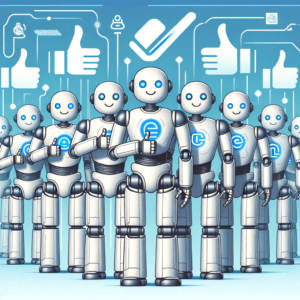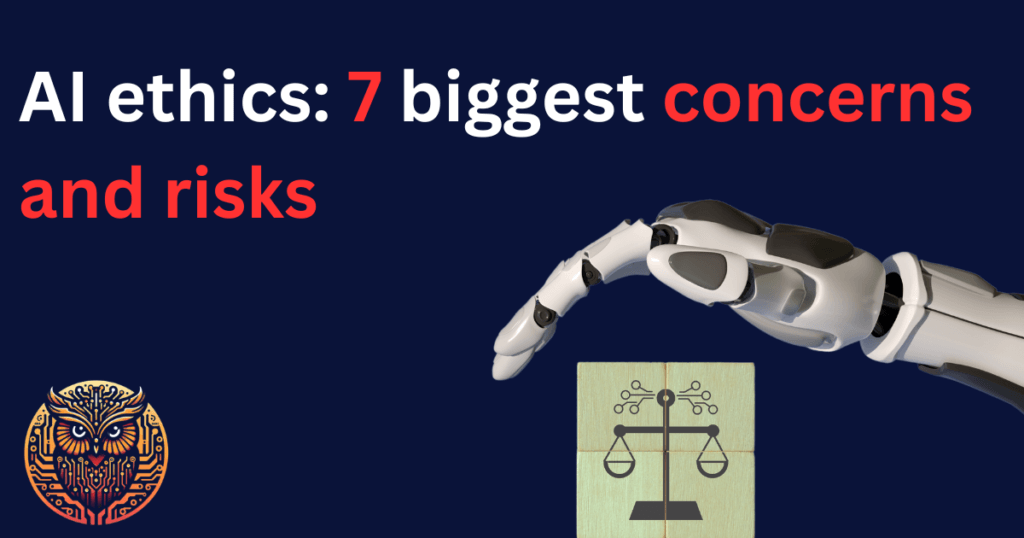AI ethics: 7 biggest concerns and risks

Ai ethics In 2023, the world of Artificial Intelligence (AI) is not just about technological breakthroughs; it’s also about facing ethical challenges. AI ethics has become a crucial area of focus, dealing with how AI impacts society, the rules that govern its use, and ensuring its safety and fairness. This evolving field seeks to balance innovation with moral responsibility, shaping the future of AI in a way that benefits everyone.
AI Ethics Concerns:
These AI ethical concerns can be broadly categorized into following main areas:
Social and Human Impact in AI ethics:
AI has the potential to worsen current social and economic inequalities, leading to job displacement, marginalization, and discrimination. It can also erode privacy and autonomy, and its use in autonomous weapons systems raises serious moral and ethical questions.
Governance and Oversight:
With the increasing sophistication of AI systems, the importance of establishing robust governance frameworks and oversight mechanisms cannot be overstated. AI ethics revolves around creating a common ground of ethical principles that guide the development and application of AI. It calls for active participation from the tech industry in adhering to these principles, going beyond mere declarations to tangible actions and research efforts that are peer-reviewed and transparent.
Security Perspective in AI ethics:
AI systems must be designed and implemented to be safe and secure, minimizing the risks of unintended consequences, cyberattacks, and misuse. This includes ensuring robust data governance, implementing appropriate safety measures, and developing transparency mechanisms.
The Challenge of Technical Safety in AI
It is important to make sure that the AI systems are reliable and do not pose any risks to the users and it is a critical aspect of AI ethics. This involves mitigating risks associated with unintended consequences, vulnerabilities to cyberattacks, and potential misuse. Implementing strong data governance policies, safety measures, and maintaining transparency are crucial for creating AI systems that are not only effective but also ethically sound.
The Role of Transparency and Human Oversight in AI
Transparency in AI decision-making is essential for fostering understanding and accountability. AI ethics emphasizes the need for human oversight to ensure that AI applications respect human rights and prevent harm. This is particularly relevant in sensitive sectors like healthcare, where AI’s decision-making capabilities pose significant ethical questions.
Addressing Bias and Discrimination in AI
One of the major challenges in AI ethics is the tendency of AI systems to mirror the biases present in their training data, leading to discrimination and inequality. This necessitates a proactive approach to mitigate such biases, ensuring fairness and equality in AI applications. Moreover, the rise of generative AI brings its own set of ethical concerns, including content bias and issues related to internet resources and copyright laws.
Accountability in the Future of AI Ethics
The aspect of accountability in AI, particularly when errors or unintended decisions occur, is a complex issue in AI ethics. It demands a shift from individual to collective responsibility among developers, users, and regulatory bodies. The discourse on AI ethics also highlights the importance of addressing retrospective bias in data, underscoring the need for ongoing vigilance and ethical decision-making in both the development and deployment of AI technologies.
Addressing these ethical concerns

Addressing these ethical concerns requires a multifaceted approach that involves:
Open Dialogue and Public Engagement:
Fostering open dialogue and public engagement on the ethical implications of AI is essential to ensuring that societal values are reflected in AI development and use.
International Cooperation and Norm-Setting:
Collaboration among governments, international organizations, and stakeholders is needed to establish shared ethical principles and guidelines for AI development and deployment.
Industry Self-Regulation and Responsibility:
The technology industry has a responsibility to develop and deploy AI in a responsible manner while adhering to ethical principles and upholding human rights standards.
Transparency and Accountability:
It’s important for AI systems to have clear and understandable decision-making processes, ensuring that they can be held accountable and their actions can be easily understood.
Human Oversight and Control:
Human oversight and control must be maintained over AI systems to ensure that they are not used in ways that violate human rights or cause harm.
Mitigating Bias and Discrimination:
Bias and discrimination must be mitigated in AI systems to ensure fairness and equal treatment for all.
Accountability and Redress:
Mechanisms for accountability and redress must be established to address the harm caused by AI systems.
Continuous monitoring and evaluation:
AI systems need ongoing monitoring and assessment to ensure they align with ethical standards, and their design and application should evolve to mirror changing societal norms and values.
Conclusion:

In conclusion, think of AI ethics in 2023 like a guide helping a hiker navigate a tricky mountain path. Just like a guide ensures the hiker stays safe, enjoys the journey, and respects nature, AI ethics helps us use AI safely and fairly. It’s like making sure AI follows traffic rules in a busy city, avoiding accidents and keeping everyone safe. By focusing on good rules (governance), safety, clear directions (transparency), fairness (avoiding bias), and responsibility (accountability), we’re making sure that our journey with AI is beneficial, safe, and respectful to everyone in society, just like a good guide on a mountain trail.
Frequently Asked Questions regarding AI ethics:
here are five frequently asked questions (FAQs) that are commonly inquired about:
- What are the major ethical concerns with AI?
- The major ethical concerns include data privacy, bias and discrimination in AI algorithms, accountability for AI decisions, the impact of AI on employment, and ensuring AI safety and security.
- How can bias in AI be addressed?
- Bias in AI can be addressed by using diverse and representative data sets, implementing regular audits for fairness, and involving a diverse group of developers in the AI creation process.
- Who is responsible when AI makes a wrong decision?
- Accountability in AI is complex and should be shared among developers, users, and regulatory bodies. Establishing clear guidelines and ethical standards is crucial for determining responsibility.
- Can AI ethics hinder technological advancement?
- Rather than hindering, AI ethics aims to guide technological advancement responsibly, ensuring that AI benefits society as a whole without causing harm or injustice.
- How important is transparency in AI systems?
- Transparency is crucial for understanding how AI systems make decisions, fostering trust and accountability, and ensuring that these systems can be audited and regulated effectively.




